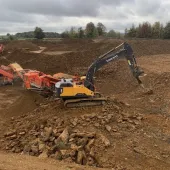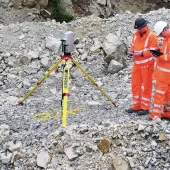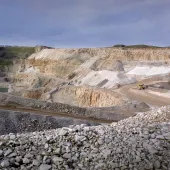Mineral reserves replenishment rates unsustainable

Mineral Products Association says Britain’s mineral reserves heading towards all-time low
THE mineral reserves on which Britain’s construction and manufacturing sectors depend are heading towards an all-time low, with replenishment rates continuing to fall behind sales volumes.
That is the key finding of the Mineral Products Association’s 9th Annual Mineral Planning Survey (AMPS 2021) for the period to the end of 2020. Based on data for the whole of Great Britain provided in confidence by MPA members, the results show that the long-term mineral reserve base for aggregates remains under pressure, with sales volumes exceeding replenishment volumes.
The new report is set against the backdrop of decreasing aggregates sales in 2019 (–4.8%) and 2020 (–8.8%) compared with 2018. The slowdown in 2019 was partly due to Brexit uncertainty that particularly affected commercial construction projects. The decline in sales in 2020 reflects the impact of the first Covid lockdown, although demand rebounded quickly over the second half of the year and into 2021.
Across Great Britain the demand for land-sourced sand and gravel continues to outstrip the new reserves being permitted, with the 10-year average replenishment rate at 63%. In 2020 only 36% of annual sales were replaced by newly permitted reserves. In the case of crushed rock, the 10-year average replenishment rate stands at 76%, with new reserves permitted in 2020 representing 52% of annual sales.
Analysis of regional replenishment rates and annual sales illustrate the declining reserve trends that are emerging across Great Britain, particularly in regions such as the Midlands and South West that traditionally have exported large volumes of aggregates to other regions. The 10-year average data shows that key regions responsible for national supply are facing challenges in maintaining their reserve base given the pressures of ongoing demand.
The AMPS data, which show the interface between mineral operators and the land-use planning system, are derived from original MPA data together with information from the annual Aggregate Working Party reports. This work is then compiled in the form of the MPA Annual Mineral Planning Survey (AMPS) reports.
The key findings of the Survey are:
- Sales – Land-sourced aggregates sales volumes from MPA members declined for two consecutive years in 2019 (–4.8%) and 2020 (–8.8%), from a total of 140 million tonnes in 2018 to 122 million tonnes in 2020;
- Replenishment of sand and gravel reserves – Just 36% of annual sales were replenished through new permissions in 2020, and with a rolling 10-year average of 63%, sales continue to outstrip the new reserves permitted;
- Replenishment of crushed rock reserves – The 10-year average for the replenishment of crushed rock reserves is 76%, with 54% of annual sales in 2020 replaced by newly permitted crushed rock reserves;
- Number of planning applications – There were 35 applications in 2020 (40 in 2019). Out of this total, nine (13 in 2019) were for new land-won aggregate (sand and gravel and crushed rock) extraction, with the vast majority of those being for extensions to existing operations rather than new sites;
- Number of planning decisions – 15 applications (11 in 2019) were determined for sand and gravel extraction in 2020, with 14 being granted (nine in 2019), one refused (two in 2019) and a further two withdrawn. For crushed rock in 2020, two applications were approved (three in 2019) with no refusals;
- Time taken to obtain permission – Over the period 2008-2020, it took on average 35.7 and 34.3 months, respectively, to secure permission (from the commencement of pre-application discussions to the permission being issued) for new sand and gravel and crushed rock reserves;
- Plan allocations– Over the past 10 years, 38% of all new permissions issued were for sites that had not been allocated in a mineral plan.
Announcing the publication of AMPS 2021, MPA executive director of planning and mineral resources, Mark Russell, said: ‘Mineral products represent the largest material flow in the economy, with the vast majority of supply used in UK construction but also supporting a variety of industrial and manufacturing activities. As such, these resources are of strategic importance to the economy.
‘The continued decline in aggregate reserves, nationally and regionally, is a stark reminder that the future ‘steady and adequate’ supply of these essential minerals cannot be assumed. It requires effective planning, management, and monitoring, and there is a continued clear desire from both local authorities and from industry for the national and sub-national guidelines for aggregates provision to be updated to support the Managed Aggregate Supply System (MASS). The case for a national statement of need has never been stronger and we will continue to press Department of Levelling Up, Housing and Communities ministers for this.
‘The under-replenishment of mineral reserves over the last decade represents an unsustainable position, and the fact that the decline continues, despite two years of reduced aggregate sales, should ring alarm bells given the role of these minerals in underpinning the Government’s ambitions around net zero, green recovery and ‘levelling up’. Looking forwards, there is certainly no evidence that demand for these strategic resources will reduce over the next decade and beyond. As such, the pressures on the reserve base will only increase unless something changes.
‘To secure the most sustainable and cost-effective supply of these materials will require active support and management, backed by data to monitor performance, in order to ensure the right resources can be made available in the right place and at the right time.’









